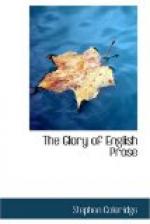“I strove with none, for none was
worth my strife;
Nature I loved, and next to
Nature Art;
I warmed both hands before the fire of
life;
It sinks, and I am ready to
depart.”
It does not detract from the merit of the lines that as a fact Landor was of a fiery disposition, and strove a great deal with many adversaries, often of his own creation, throughout his long life[1]; and although he was of a fierce and combative nature he displayed in his writings a classical restraint and tender beauty hardly achieved by his contemporaries.
In the form of an imaginary conversation between AEsop and Rhodope, Landor makes the latter describe how her father, in the famine, unbeknown to her, starved that she might have plenty, and, when all was gone, took her to the market-place to sell her that she might live. There is an exquisite delicacy in this dialogue that places it among the wonders of literature:—
“Rhodope. Never shall I forget the morning when my father, sitting in the coolest part of the house, exchanged his last measure of grain for a chlamys of scarlet cloth, fringed with silver. He watched the merchant out of the door, and then looked wistfully into the cornchest. I, who thought there was something worth seeing, looked in also, and finding it empty, expressed my disappointment, not thinking, however, about the corn. A faint and transient smile came over his countenance at the sight of mine. He unfolded the chlamys, stretched it out with both hands before me, and then cast it over my shoulders. I looked down on the glittering fringe and screamed with joy. He then went out; and I know not what flowers he gathered, but he gathered many; and some he placed in my bosom, and some in my hair. But I told him with captious pride, first that I could arrange them better, and again that I would have only the white. However, when he had selected all the white and I had placed a few of them according to my fancy, I told him (rising in my slipper) he might crown me with the remainder.
“The splendour of my apparel gave me a sensation of authority. Soon as the flowers had taken their station on my head, I expressed a dignified satisfaction at the taste displayed by my father, just as if I could have seen how they appeared! But he knew that there was at least as much pleasure as pride in it, and perhaps we divided the latter (alas! not both) pretty equally.
“He now took me into the market-place, where a concourse of people were waiting for the purchase of slaves. Merchants came and looked at me; some commending, others disparaging; but all agreeing that I was slender and delicate, that I could not live long, and that I should give much trouble. Many would have bought the chlamys, but there was something less saleable in the child and flowers.
“AEsop.
Had thy features been coarse and thy voice rustic,
they
would all have patted thy
cheeks and found no fault in thee.




